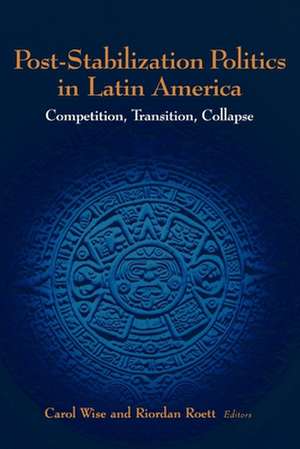Post-Stabilization Politics in Latin America: Competition, Transition, Collapse
Editat de Carol Wise, Riordan Roetten Limba Engleză Paperback – 28 iul 2003
Over the last twenty years Latin America has seen a definitive movement toward civilian rule. Significant trade, fiscal, and monetary reforms have accompanied this shift, exposing previously state-led economies to the forces of the market. Despite persistent economic and political hardships, the combination of civilian regimes and market-based strategies has proved to be remarkably resilient and still dominates the region. This book focuses on the effects of market reforms on domestic politics in Latin America. While considering civilian rule as a constant, the book examines and compares domestic political responses in six countries that embraced similar packages of reforms in the 1980s—Argentina, Brazil, Chile, Mexico, Peru, and Venezuela. The contributors focus on how ambitious measures such as liberalization, privatization, and deregulation yielded mixed results in these countries and in doing so they identify three main patterns of political economic adjustment. In Argentina and Chile, the implementation of market reforms has gone hand in hand with increasingly competitive politics. In Brazil and Mexico, market reforms helped to catalyze transitions from entrenched authoritarian rule. Finally, in Peru and Venezuela, traditional political systems have collapsed and civilian rule has been repeatedly challenged. The contributors include Carol Wise (University of Southern California), Karen L. Remmer (Duke University), Carol Graham (Brookings Institution), Stefano Pettinato (United Nations Development Programme), Consuelo Cruz (Tufts University), Juan E. Corradi (New York University), Delia M. Boylan (Chicago Public Radio), Riordan Roett (Johns Hopkins University), Martín Tanaka (Institute for Peruvian Studies, Lima), and Kenneth M. Roberts (University of New Mexico).
Preț: 232.27 lei
Nou
Puncte Express: 348
Preț estimativ în valută:
44.45€ • 46.52$ • 36.99£
44.45€ • 46.52$ • 36.99£
Carte tipărită la comandă
Livrare economică 31 martie-14 aprilie
Preluare comenzi: 021 569.72.76
Specificații
ISBN-13: 9780815793830
ISBN-10: 0815793839
Pagini: 306
Ilustrații: Illustrations
Dimensiuni: 152 x 229 x 22 mm
Greutate: 0.43 kg
Editura: Brookings Institution Press
Colecția Brookings Institution Press
Locul publicării:United States
ISBN-10: 0815793839
Pagini: 306
Ilustrații: Illustrations
Dimensiuni: 152 x 229 x 22 mm
Greutate: 0.43 kg
Editura: Brookings Institution Press
Colecția Brookings Institution Press
Locul publicării:United States
Notă biografică
Edited by Carol Wise and Riordan Roett
Descriere
Over the last twenty years Latin America has seen a definitive movement toward civilian rule. Significant trade, fiscal, and monetary reforms have accompanied this shift, exposing previously state-led economies to the forces of the market. Despite persistent economic and political hardships, the combination of civilian regimes and market-based strategies has proved to be remarkably resilient and still dominates the region. This book focuses on the effects of market reforms on domestic politics in Latin America. While considering civilian rule as a constant, the book examines and compares domestic political responses in six countries that embraced similar packages of reforms in the 1980s—Argentina, Brazil, Chile, Mexico, Peru, and Venezuela. The contributors focus on how ambitious measures such as liberalization, privatization, and deregulation yielded mixed results in these countries and in doing so they identify three main patterns of political economic adjustment. In Argentina and Chile, the implementation of market reforms has gone hand in hand with increasingly competitive politics. In Brazil and Mexico, market reforms helped to catalyze transitions from entrenched authoritarian rule. Finally, in Peru and Venezuela, traditional political systems have collapsed and civilian rule has been repeatedly challenged. The contributors include Carol Wise (University of Southern California), Karen L. Remmer (Duke University), Carol Graham (Brookings Institution), Stefano Pettinato (United Nations Development Programme), Consuelo Cruz (Tufts University), Juan E. Corradi (New York University), Delia M. Boylan (Chicago Public Radio), Riordan Roett (Johns Hopkins University), Martín Tanaka (Institute for Peruvian Studies, Lima), and Kenneth M. Roberts (University of New Mexico).














